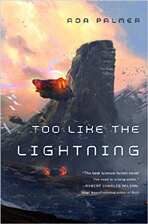Review: Too Like the Lightning
You know, I’ve read quite a bit of Science Fiction in my time. I’ve read near-future thrillers, and I’ve read far-future alien stories. I’ve read first contact stories, and stuff that feels more like it’s at home in Fantasy than Sci-fi. I’ve read big, fat hard science fiction stories and I’ve read quick, lite page turner actioners. I’ve gone back and read almost all of the Hugo award-winning novels and I’ve read all of the Hugo nominees of the past 10 years, as well. So when I say I’ve read a lot of Science Fiction, I really mean it. And yet in all of that, I’ve never read a novel quite like TOO LIKE THE LIGHTNING by Ada Palmer.
And this is a big problem for me. The way that I generally go about reviewing books is mostly based on comparison. I tell you about a book and I reference it to another book that I’ve read. If you, my dear reader, have read that same book and have similar feelings about it, then you know you can take my advice seriously. Let me give you an example. I recently went and saw the movie The Arrival. I thought it was excellent and amazing. However if someone asked me what I thought and I said, “It was so good, you have to see it,” and then they go and see the movie expecting maybe an action movie like Star Wars or Independence Day they would be really disappointed. If, however, I say, “It was so good. It has some of the same sense of wonder that 2001 has and it’s a really great, thought-provoking movie.” Then they go see it and they love it. See what I mean?
Now what do I do with TOO LIKE THE LIGHTNING? Let’s start with a synopsis. This is from Amazon:
“Mycroft Canner is a convict. For his crimes he is required, as is the custom of the 25th century, to wander the world being as useful as he can to all he meets. Carlyle Foster is a sensayer–a spiritual counselor in a world that has outlawed the public practice of religion, but which also knows that the inner lives of humans cannot be wished away.
“The world into which Mycroft and Carlyle have been born is as strange to our 21st-century eyes as ours would be to a native of the 1500s. It is a hard-won utopia built on technologically generated abundance, and also on complex and mandatory systems of labelling all public writing and speech. What seem to us normal gender distinctions are now distinctly taboo in most social situations. And most of the world’s population is affiliated with globe-girdling clans of the like-minded, whose endless economic and cultural competition is carefully managed by central planners of inestimable subtlety. To us it seems like a mad combination of heaven and hell. To them, it seems like normal life.
“And in this world, Mycroft and Carlyle have stumbled on the wild card that may destabilize the system: the boy Bridger, who can effortlessly make his wishes come true. Who can, it would seem, bring inanimate objects to life…”
As synopses go, this one isn’t bad. At least for me, and I’ve read the book. It mentions Mycroft Canner, who is not only the central figure in the book, but also the narrator (and a delightful one he is too–some of his asides are just wonderful). It mentions Carlyle, who is also important. It mentions Bridger who can make objects come to life! There are books that would deal with that in a really whiz-bang manner and have all kinds of crazy things, but this book is more ponderous. There are lots of discussions about whether the world should know about what Bridger can do. What is it exactly that Bridger should do for people? Are there right and wrongs about his gift? Wonderful stuff. The synopsis doesn’t mention, however, ten or so other really important characters, or the political machinations of each group of people, or the technology that exists at the time and how that shapes the world, or the interconnections of each of the characters. There’s really just too much to tell.
If you're a fan of big ideas, give this a shot. If you're looking for a fun, action-packed beach read, go somewhere else.
So let’s cut down to it shall we? There are good things in this book, oh yes there are! There are some really great scenes and some fascinating ideas. There are the asides which I in particular loved. There were surprises. Honestly a few times the rug got pulled out from beneath my feet; the book made me think, in the best possible way. Are there problems? For me, yes there are. Some of the political stuff can get confusing and some of the motivations for the characters seem suspect. The society is interesting, but I could never fully buy into it. Some of the connections between characters felt a little too contrived as well.
So what do we make of it then? I honestly don’t know. I read the book awhile ago and I’m still coming to grips with what I thought about it. A boring book I could just put down and leave it alone. This book is taunting. There’s a lot there to like and a bit to not. Based on my above ramblings I guess you’ll just have to decide for yourself. As for me, I think the surprises were enough for me to want to read the second volume (btw, this is definitely the first half of a story, don’t expect a nice, neat ending). If you’re a fan of big ideas then I would give this a shot. If you’re looking for a fun, action-packed beach read, I’d go somewhere else.
- Recommended Age: 16+ for a lot of reasons. The book is thick and hard and philosophical. There is also some language and some strongly implied sex.
- Language: Mentions of past crimes that can be pretty gruesome, but nothing overtly shown
- Violence: A bit here and there
- Sex: A few scenes that while not shown outright still had a very graphic feel to them.

 )
)

